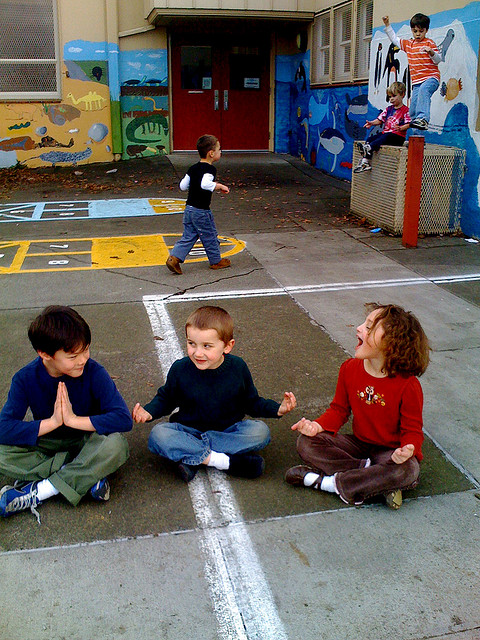What if there was a “magic vitamin” that made children healthier, smarter, more calm and compassionate? Would you give it to them?
The benefits of regular meditation for adults have been well-established in scientific research: stress relief, mental focus, life balance, and overall contentment.
But what about children?
In today’s fast-paced world, kids’ lives can be just as hectic as their parents’ lives, and habits tend to have more “sticking power” when they’re picked up at an early age.
Susan Kaiser Greenland, author of The Mindful Child, wrote,
“Mindfulness is a refined process of attention that allows children to see the world through a lens of attention, balance and compassion. When children learn to look at the world with attention, balance and compassion they soon learn to be in the world with attention, balance and compassion.”
There are many different views on how to raise children, and meditation is just one component of this large, complex puzzle. It’s worth noting that meditation is not declaring any form of spirituality or religious dogma. It is a secular practice that has many useful applications.
Not only can meditation bring about immediate behavioral changes in children, but it can also teach them how to make difficult life decisions and feel connected to the world around them.
What is my personal interest here?
I have been teaching adults how to meditate for a few years now and enjoy watching the “lights come on” after a couple weeks of daily practice. This consistent observation of mindfulness and awakeness takes me back to the time this originally happened for me, where all of a sudden life seems to be more vivid, clear, and alive. We are anchored in an energized and calm state of being.
Over time I noticed that students would report that their little children were taking interest in the practice by simply watching their moms and dads meditate. My students indicated that their children seemed to take to meditation effortlessly (or at least easier than they did), like a duck to water as they say. This sparked my curiosity, and so I ask the question “Why aren’t we teaching kids to meditate as well?”
Research on Childhood Meditation
Did you know that more than two million children in the U.S. were diagnosed with attention-deficit/hyperactivity disorder (ADHD) between 2003 and 2012? Although most children with ADHD are diagnosed with the condition by age six, severe cases are often diagnosed by age four. Over half of these kids are taking prescription ADHD medication and will remain on medication throughout their teen years.
Since meditation has shown to help adults concentrate and focus in their daily lives, researchers have begun to study the effects of meditation on kids too. The National Therapies Research Unit at the Royal Hospital for Women in Australia conducted a study of 26 children with ADHD between the ages of four and 12 who were treated with Sahaja Yoga Meditation for six weeks.
These were the main findings of the study:
Reduced hyperactivity
Reduced impulsiveness and inattention
Improved parent-child relationships
Enhanced self-esteem
Reduced use of medication in 50% of children
Stress can begin to impact children at a very young age, and stressful situations affect health and well-being almost immediately. In a study at the University of Florida, researchers surveyed nearly 96,000 U.S. children to collect data about their health following situations of parental divorce, domestic and neighborhood violence, poverty, and exposure to drug abuse.
Like adults, meditation can help children cope with stresses and traumas by being mindful about present situations and thinking clearly and rationally about them.
According to research conducted at UCLA by Greg Flaxman and Lisa Flook, Ph.D., mindful meditation can strengthen parent-child relationships and have mutually-beneficial results in many types of families.
Parents of children with autism developmental disabilities reported more satisfaction and less stress with mindfulness practice. Meanwhile, their children were happier and listened better after mindfulness training.
Aside from the emotional and behavioral benefits, recent research suggests that meditation can actually boost academic performance in children as well. A study published in Developmental Psychology found that 4th and 5th grade students who regularly performed meditation exercises did 15% better on math tests.
Meanwhile, the meditation program students showed 24% better social behaviors, were 24% less aggressive, and perceived themselves as 20% more pro-social. Researchers analyzed the British Columbia students for four months and were astonished at the positive results.
“Doing these kinds of programs in school does not take away from academics,” said co-author and developmental psychologist Kimberly A. Schonert-Reichl. “It adds to a growing research literature that’s showing, actually, these kinds of programs and practices increase academic gains.
By adding this on, you not only create more academically capable, successful students, but actually create more caring, less stressed, kind students.”
Does Meditation Help in School?
Since meditation is known to help kids focus their energies and reduce tensions, overwhelming evidence suggests that it can help them perform better in school. In fact, meditation can have a profound impact on not only academics, but also athletic, creative and social performance.
When meditation is incorporated into the learning process, kids can find perspective, embrace simplicity, and be more compassionate. Schools all across America have begun adding meditation to their curriculum with positive results.
New Haven Academy in Connecticut made headlines by requiring incoming freshman to take yoga and meditation classes three times a week, and several San Francisco schools in rough neighborhoods have found success with in-school meditation programs too.
Students in these programs have showed unprecedented progress in stress management, class attendance, and test proficiency. Several other studies published in well-established journals have mirrored these results and also revealed less hyperactive behavior, improved mood, and fewer depression symptoms. The Atlantic recently published a great article about how schools can teach kids to meditate that’s worth reading.
How Young Can Kids Start?
This is a great question, and one that yields different answers from parents and child experts. The Dalai Lama once said, “If every 8-year-old in the world is taught meditation, we will eliminate violence from the world within one generation.” However, every child matures at a different rate and can be ready to meditate at a different age.
Some experts have recommended starting with one minute of meditation per day, per year of age. However, young children diagnosed with ADHD may benefit from starting earlier than their peers.
A study published in the Journal of Applied School Psychology showed that 1st through 3rd graders who enrolled in a 12-week breath awareness and yoga program saw improvements in their attention spans, social skills, and reduced test anxiety.
Part of the reason meditation hasn’t caught on faster is because most “experts” don’t do a good job of teaching it. For instance, starting with a 10-20 minute meditation at first is like asking a novice to bench press 300 lbs or run 20 miles on day one. This topic deserves it’s own article, so I digress.
So yes, teaching children to meditate is clearly one of the best ideas we have come up with in the past decade because it’s a simple practice that has far reaching, cascading positive effects.
I know that one day when I have children of my own they will be little baby Buddhas.
~
Author: Chris Willitts
Editor: Katarina Tavčar
Photo: Todd Fahrner/Flickr



Read 0 comments and reply